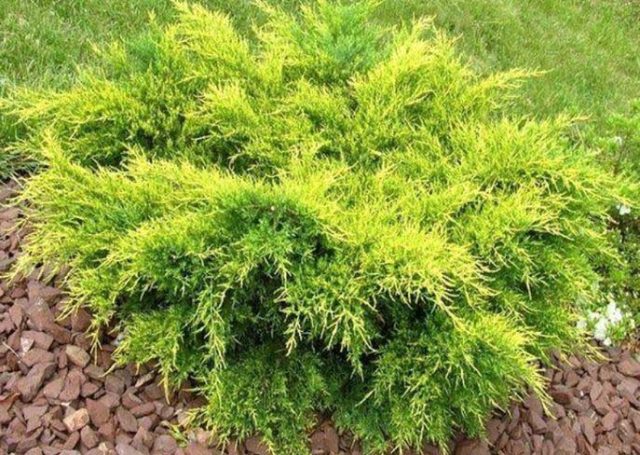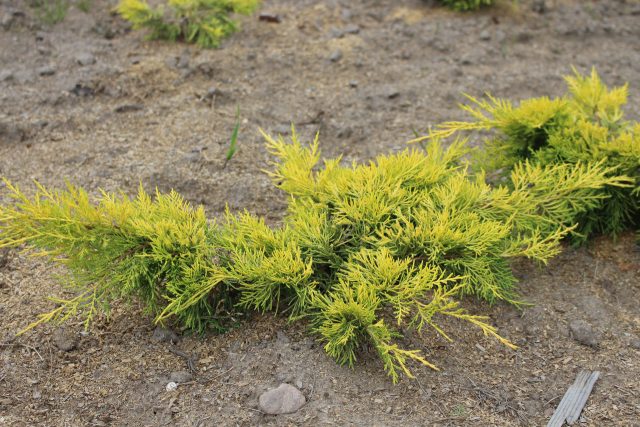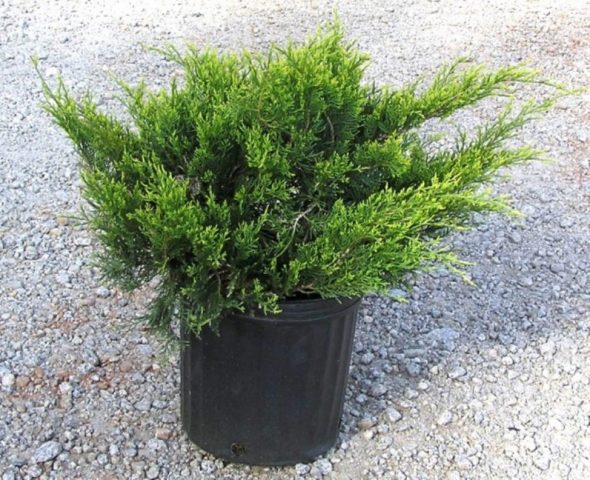Content
- 1 Description of juniper medium Old Gold
- 2 Winter hardiness zone of juniper Old Gold
- 3 Juniper medium Old Gold in landscape design
- 4 Planting and caring for juniper Chinese Old Gold
- 5 Reproduction of juniper pfitzeriana Old Gold
- 6 Diseases and pests of juniper media Old Gold
- 7 Conclusion
- 8 Juniper average Old Gold reviews
Juniper Old Gold is used in garden design as one of the best varieties of coniferous shrubs with golden foliage. The bush is unpretentious to care for, winter-hardy, retains high decorative qualities throughout the year. The plant is undemanding to the quality of the soil and the environment, therefore it is suitable for planting in the urban landscape.
Description of juniper medium Old Gold
The middle juniper (juniperus pfitzeriana Old Gold) is an evergreen coniferous plant with a greater growth in width than in height. One of the most beautiful juniper varieties with golden needles. The variety was obtained in Holland, in the middle of the last century.
The long-growing shrub adds about 5-7 cm in height and 15-20 cm in diameter every year. By the age of 10, the height of the Old Gold juniper is 50 cm, and the width is 1 m.In the future, the shrub grows only in diameter, the maximum size of which can reach 3 m.Thus, in adulthood, the bush forms a symmetrical, flat and dense crown of bright color ...
When growing in sunny areas, the needles acquire a golden hue, turning into a bronze color in cold weather. The needles are distinguished by their grace and retain a pleasant shade throughout the year.
When growing a juniper, it must be borne in mind that parts of the plant are poisonous, they should not be allowed to be cut off by children or animals.
Winter hardiness zone of juniper Old Gold
Winter hardiness zone juniper pfitzeriana Old Gold - 4. This means that the culture is able to withstand winter temperatures in the range of -29 ... -34 ° C. The 4th frost resistance zone includes most of Central Russia.
Juniper medium Old Gold in landscape design
In landscape design, they are used in single and group plantings on lawns and in compositions with other plants. In the container culture, they are used to decorate balconies and loggias, in the open field - curbs and flower beds.
Low-growing junipers are used to decorate the lower rows of coniferous corners with the participation of other evergreen crops, for example, pines and thuja, junipers of other varieties. When planting a young plant in open ground, one should take into account the growth of the diameter of the crown of the Old Gold juniper by 2.5-3 m.
Juniper Old Gold is used in joint plantings with hydrangeas and heather. Bulbous crops are planted in the aisles of the juniper alley:
- tulips;
- hyacinths;
- gladioli;
- decorative bow.
Planting and caring for juniper Chinese Old Gold
Juniper Old Gold is planted in open, sunny areas. When growing in the shade, shrubs become shapeless, with a loose crown and lose their decorative qualities. Junipers are planted in places where melt and rain water does not linger.
The culture is unpretentious to the soil, but soils with weak or neutral acidity are preferred for planting. Light and loose, well-drained soil can be prepared by yourself and filled with a planting hole. The soil mixture for planting is prepared from 2 parts of peat and 1 part of sod land and sand. You can also add forest juniper litter to the substrate.
Seedling and planting plot preparation
Young plants with a closed root system are watered before planting to make it easier to remove the earthen ball. The root system is sprayed with growth stimulants. For a single planting, a pit is prepared several times larger than the earthen lump. For group plantings, a trench is dug.
A drainage layer of about 20 cm is poured at the bottom of the planting pit. Sand, fine stone or broken brick is used as drainage.
Landing rules
Seedlings can be replanted at any warm time by choosing a cloudy day. In the planting hole, the plant is placed without deepening, so that the root collar is 5-10 cm above the soil level.
After filling the planting hole, the soil is lightly pressed and an earthen roller is made around the trunk circle. So, when watering, the water will not spread. After planting, a bucket of water is poured into the root zone. In the following week, the juniper is also regularly watered. For better survival, the bush is shaded at first.
When transplanting a seedling from a place of temporary germination, it is necessary to observe the direction of the cardinal points in which it grew before.
Watering and feeding
Juniper Old Gold is drought-resistant, so it is watered several times during the dry season. For irrigation, use about 30 liters of water per plant. The shrub does not tolerate dry air, so it must be sprayed once a week, in the evening.
Fertilizing crops need infrequent, it is enough to apply 40 g per 1 square meter in the middle of spring. m nitroammofoski or "Kemira-universal", in the ratio of 20 g of the drug per 10 liters of water. Granular fertilizer is scattered around the trunk circle, covered with a small layer of soil and watered. Organic fertilizers are not used for feeding. Manure or bird droppings cause root burns.
Mulching and loosening
Surface loosening is necessary for young junipers; it is carried out together with weeding and after watering. Mulching the soil protects the roots from overheating and has a decorative function. For mulch, tree bark and chips, stones, nutshells are used. The protective layer is poured 5-7 cm high.
Trimming and shaping
Regular pruning is not required for the plant. But the shrub lends itself well to formative pruning, which is carried out 1-2 times a year. Especially formative pruning becomes necessary when growing Old Gold Juniper in containers. Broken shoots are removed in the spring.
During work on pruning shoots, it is necessary to use protective equipment so that the sap or resin of the plant does not get on the mucous membrane. Because there are poisonous compounds in the parts of the plant.
Preparing for winter
The frost resistance of the Old Gold juniper allows you to leave it for the winter without shelter. But a young, small-sized Old Gold juniper is recommended to be protected. To do this, the trunk circle is insulated with a thick layer of sawdust or peat. With little snow cover, the crown is covered with spunbond. In order to protect the uncovered crown from sunburn in early spring, the plants are shaded with screens.
In the spring, snow from the Old Gold juniper must be swept away so that it does not break the shoots during melting and does not create stagnant moisture. After the snow melts, the old mulch from under the bush is removed and a new one is poured.
Wintering juniper Old Gold in the apartment
In the description of the coastal Old Gold juniper, it is indicated that it can be grown in container culture. In order for the root system in the containers not to freeze over in winter, the plants are brought into the room. But in winter it is necessary for the plant to be dormant, so the temperature of the content should not be high. A warm loggia is well suited for wintering. During bright sun, it is necessary to be able to shade so that the plant does not overheat.
Reproduction of juniper pfitzeriana Old Gold
Ornamental forms of juniper are propagated by cuttings. Planting material is taken only from adult 8-10-year-old bushes. In early spring, cuttings about 10 cm long are cut, on the lower part of which lignification should be present. The bottom of the cutting by 5 cm is freed from needles and soaked in growth stimulants.
Further rooting takes place in planting tanks filled in equal parts with a mixture of sand and peat. It takes about a month to develop the root system. After that, the seedling is transferred to open ground, where it is left for the winter, covering it with spruce branches. So, the plant is grown for several years, and then transplanted to a permanent place of growth.
Diseases and pests of juniper media Old Gold
Juniper (juniperus media Old Gold) is disease resistant and rarely attacked by pests. But after wintering, weak plants can suffer from desiccation and sunburn, and become infected.
Rust damage in juniper often occurs when growing near pome fruit trees - plants that are intermediate hosts of fungal formations. The affected areas are excised and burned. To prevent other fungal diseases, spring prophylactic spraying with fungicides or preparations containing copper is carried out.
With a close location of anthills, aphids appear on the juniper. Insects are especially harmful to young shoots, inhibiting their development. Aphids are washed off from populated areas with water or soapy water, covering the roots from liquid soap. The procedure is carried out until the complete disappearance of the parasites.
The spider mite appears on the bush during the dry season. A cobweb appears at the site of the lesion, the needles turn brown and then crumble. To prevent the appearance of insects, juniper must be periodically sprayed to increase the humidity of the air. For large areas of infection, acaricides are used.
Conclusion
Juniper Old Gold is used for year-round gardening. The unpretentiousness of the culture allows even novice gardeners to use it for decorative purposes. A small annual increase allows you to grow Old Gold juniper at home, as well as in container culture in the open air.











